| | | OFFLINE | | Post: 25.139
Post: 7.641 | Registrato il: 28/08/2005
Registrato il: 20/01/2009 | Administratore | Utente Master | |
|
 GENERAL AUDIENCE TODAY
GENERAL AUDIENCE TODAY
June 27, 2012
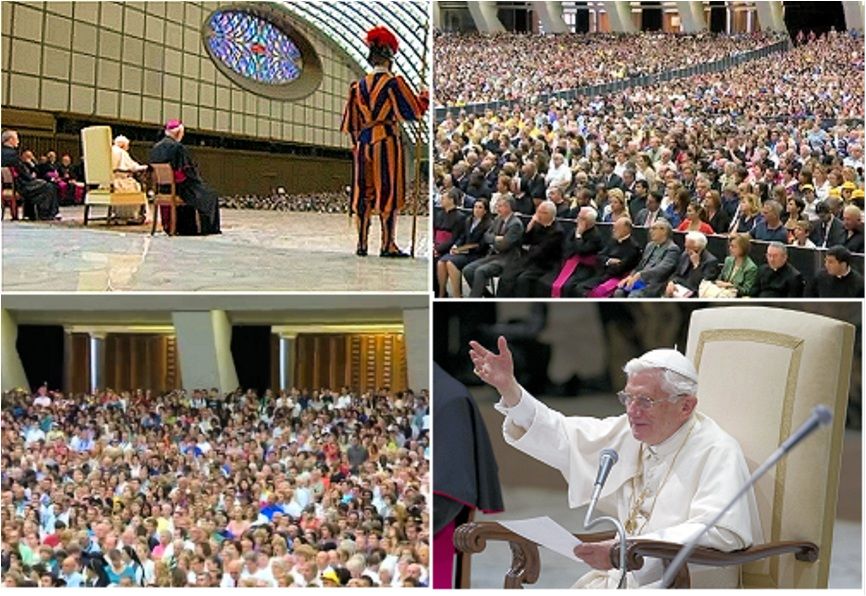
In his last General Audience before his July summer break, Pope Benedict XVI today continued his catecheses on prayer in the letters of St. Paul. Once again, the audience was held in Aula Paolo VI because of the summer heat in Rome.
The Holy Father leaves for Castel Gandolfo on Tuesday, July 2, and will be staying there to the end of September, with a brief 'interruption' when he travels to Lebanon on Sept. 12-14.
Here is how he synthesized today's catechesis in English:
As part of our continuing reflection on prayer in the letters of Saint Paul, we now turn to the great "Christological hymn" found in the Letter to the Philippians (2:6-11).
Paul, a prisoner for the Gospel, exhorts his hearers to that deep joy which is the fruit of our imitation of God’s Son, who humbled himself and took on our human nature.
Christ’s complete obedience to the will of the Father, even to death on the cross, reverses the sin of Adam and restores our original dignity. Therefore God highly exalted him and gave him the name of "Lord".
At the name of Jesus, then, every knee must bend in heaven, on earth and under the earth (vv. 9-11). As Jesus’s exaltation took place through his abasement, so in our lives and in our prayer we discover that, by lowering ourselves in humility and love, we are lifted up to God.
May we more frequently bend the knee in praise and worship of Christ’s divinity and his Lordship over all creation. In our prayer, may we be ever more faithful witnesses of his sovereignty in our every thought, word and deed.
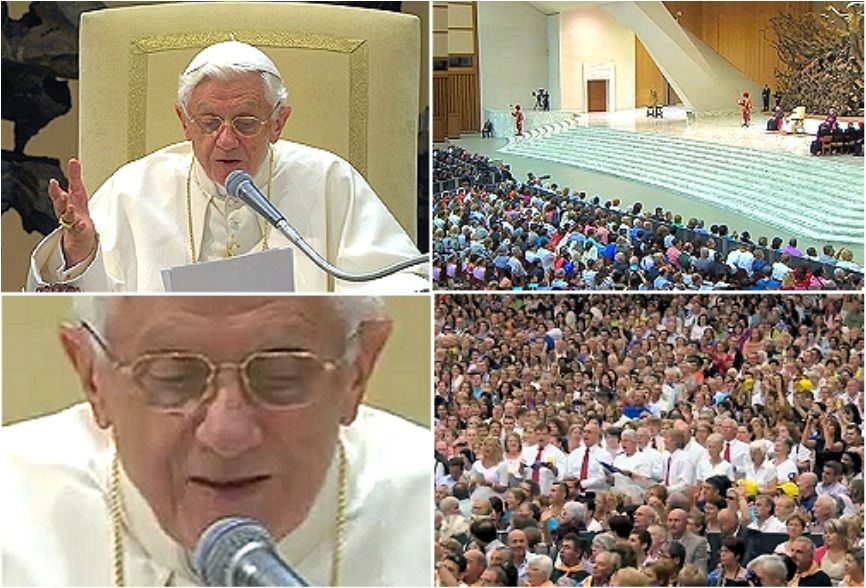
Here is a full translation of the Holy Father's catechesis:
Dear brothers and sisters,
Our prayer consists, as we have seen in past Wednesdays, of silence and speech, of singing and gestures that involve the whole person: from the mouth to the mind, from the heart to the whole body. It is a characteristic that we find in Jewish prayer, especially in the Psalms.
Today I would like to talk about one of the oldest songs or hymns of the Christian tradition, which St. Paul presents to us in what is, in a sense, his spiritual testament: The Letter to the Philippians. It is, in fact, a letter that the Apostle dictated while in prison, perhaps in Rome. He feels close to death, because he says that his life will be poured out as a libation (cf. Philippians 2.17).
Despite this situation of grave danger to his physical safety, St. Paul, throughout the text, expresses the joy of being a disciple of Christ, of being able to reach out to Him, to the point of no longer seeing his death as a loss but as gain.
In the last chapter of the Letter there is a powerful invitation to joy, a fundamental characteristic of our being Christians and of our prayer. St. Paul writes: "Rejoice in the Lord always. I shall say it again: rejoice!" (Phil 4,4).
But how can one rejoice in the face of an imminent death sentence? From where, or rather, from whom does St. Paul draw the serenity, strength, courage to go to meet his martyrdom, and the shedding of his blood?
We find the answer at the centre of the Letter to the Philippians, in what Christian tradition calls carmen Christo, the hymn for Christ, more commonly known as the 'Christological hymn', a hymn in which all attention is centered on the 'sentiments' of Christ, that is, on his thinking, as well as his lived and concrete experience.
This prayer begins with an exhortation: "Have among yourselves the same attitude that is also yours in Christ Jesus" (Phil 2,5). These feelings are presented in the following verses: love, generosity, humility, obedience to God, the gift of oneself.
It is not simply to follow the example of Jesus, as a moral thing, but to involve all of our existence in his way of thinking and acting. Prayer should lead to an ever deeper knowledge and union of love with the Lord, to be able to think, act and love like Him, in Him and for Him. To exercise this, to learn the sentiments of Jesus, is the path of Christian life.
Now I will linger briefly on some elements of this dense hymn that sums up the whole human and divine journey of the Son of God, and encompasses all of human history: from his being God, to the incarnation, to his death on the cross and his exaltation in the glory of the Father, all of which also implies the behavior of Adam, of man at his origins.
This hymn to Christ starts off from his being «en morphe tou Theou», as the Greek text says, namely, his being 'in the form of God', or better yet, in the condition of God. Jesus, true God and true man, does not live his 'being like God' in order to triumph or to impose his supremacy - he does not consider it a possession, a privilege, a jealously guarded treasure.
Rather, he 'stripped himself', he emptied himself, assuming, as the Greek text says, the 'morphe doulos', the form of a slave, which is the human reality marked by suffering, poverty, death. He assimilated himself totally in humanity, except in sin, so that he behaved as a servant completely dedicated to the service of others.
In this regard, Eusebius of Cesarea in the fourth century said: "He took upon himself the burdens of the members who suffer. He made his own our lowly diseases. He suffered and was tortured for our sake: all this in conformity with his great love for mankind" (The evangelical demonstration, 10, 1,22).
St. Paul continues by delineating the 'historical' context in which this self-abasement of Jesus took place: "He humbled himself, becoming obedient to death" (Phil 2,8). The Son of God had truly become man and completed a journey in complete obedience and faithfulness to the will of the Father up to the supreme sacrifice of his own life.
Again, more than ever, the Apostle specifies that Jesus was 'obedient to death, even death on a cross". On the cross, Jesus reached the maximum degree of humiliation, because crucifixion was the penalty reserved for slaves, not for free men: «mors turpissima crucis» (the shameful death on the Cross) wrote Cicero (cfr In Verrem, V, 64, 165).
On the Cross of Christ, man is redeemed, and the experience of Adam is overturned: Adam, created in the image and likeness of God, presumed to be like God with his own forces, to put himself in God's place, and thus he lost the original dignity that he had been given.
Jesus, on the other hand, was 'in the condition of God', but he abased himself, immersed himself in the human condition, in total fidelity to the Father, in order to redeem the Adam in us and give back man the dignity that he had lost.
The Fathers underscored that he was obedient, restoring to human nature, through his own humanity and obedience, that which was lost through the disobedience of Adam.
In prayer, in our relationship with God, we open the mind and the heart, our very will, to the action of the Holy Spirit in order to enter into that same dynamic of life, as affirmed by St. Cyril of Alexandria, whose feast we celebrate today: "The work of the Spirit seeks to transform us through the grace of perfectly copying his humiliation" (Lettera Festale 10,4).
But instead, human logic often seeks realization of the self in power, in dominion, with powerful means. Man continues to want to build with his own powers the tower of Babel so that by himself he may reach the height of God, to be like God.
The Incarnation and the Cross remind us that full self-realization is conforming our human will to that of the Father, emptying ourselves of self in order to be filled with love, the charity of God, and thus become truly capable of loving others.
Man does not find himself by remaining closed in on himself, affirming himself. Man finds himself only by leaving himself, Only if we leave ourselves do we find ourselves. If Adam wanted to imitate God, that in itself is not bad, but he was wrong in his idea of God. God is not one who only wants greatness. God is love who gives himself in the Trinity and then in Creation. To imitate God means leaving oneself, to give oneself in love.
In the second part of this Christological hymn in the Letter to the Philippians, the subject changes: it is no longer Christ, but God the Father. St. Paul underscores that it is precisely because of his obedience to the will of God that "God greatly exalted him and bestowed on him the name that is above every name" (Phil 2,9).
He who had profoundly abased himself taking on the condition of a slave was exalted, elevated over every other by the Father, who gives him the name Kyrios, Lord - the supreme dignity of lordship. In the face of this new man, in fact,given the name of God himself in the Old Testament, "every knee should bend, of those in heaven and on earth and under the earth, and every tongue confess that Jesus Christ is Lord, to the glory of God the Father" (vv 10-11).
The Jesus that is exalted is the Jesus of the Last Supper, who took off his outer garments, girded himself with a towel, and bent to wash the feet of the Apostles, asking them: "Do you realize what I have done for you? You call me ‘teacher’ and ‘master,’ and rightly so, for indeed I am. If I, therefore, the master and teacher, have washed your feet, you ought to wash one another’s feet" (Jn 13,12-14).
It is important to remember this always in our prayer and in our life: "The ascent to God comes precisely in the descent to humble service, the descent of love, which is the essence of God, and therefore the truly purifying power which makes man able to perceive and to see God" (JESUS OF NAZARETH, Milan, 2007).
The hymn in the Letter to the Philippians offers us two important indications for our own prayer. The first is the invocation Lord addressed to Jesus Christ, seated at the right hand of the Father. He is the only Lord of our life, among so many 'dominators' who wish to direct and guide it. Therefore, it is necessary to have a scale of values in which God has the primacy so we can affirm with St. Paul: "I even consider everything as a loss because of the supreme good of knowing Christ Jesus my Lord." (Phil 3,8). His encounter with the Risen One made him understand that he is the only treasure for whom it is worth giving one's own existence.
The second indication is prostration, that 'every knee may bend' on earth and in the heavens, which recalls an expression of the prophet Isaiah, when he indicates the adoration that all creatures owe to God (cfr 45,23).
Genuflection before the Most Blessed Sacrament or kneeling when we pray, express the attitude of adoration before God, even with the body. Thus the importance of this gesture, not out of habit and in haste, but with profound awareness. When we kneel before the Lord, we confess our faith in him, we acknowledge that he is the only Lord of our life.
Dear brothers and sisters, in our prayer, let us keep our gaze on the Crucified One, let us pause in adoration more often before the Eucharist, in order to make our life enter into God's love, who debased himself with humility to raise us to him.
At the start of the catechesis, we asked how is it that St. Paul could rejoice with the imminent risk of martyrdom and the shedding of his blood. This is possible only because the Apostle had never turned away his look from Christ, to the point of conforming with him in death in the hope that "somehow I may attain the resurrection from the dead" (Phil 3,11).
Like St, Francis before the Crucifix, let us also say: "Most High, glorious God, enlighten the darkness of my heart and give me true faith, certain hope and perfect charity, sense and knowledge, Lord, that I may carry out Your holy and true command. Amen" (cfr Prayer before the Crucifix FF [276])..
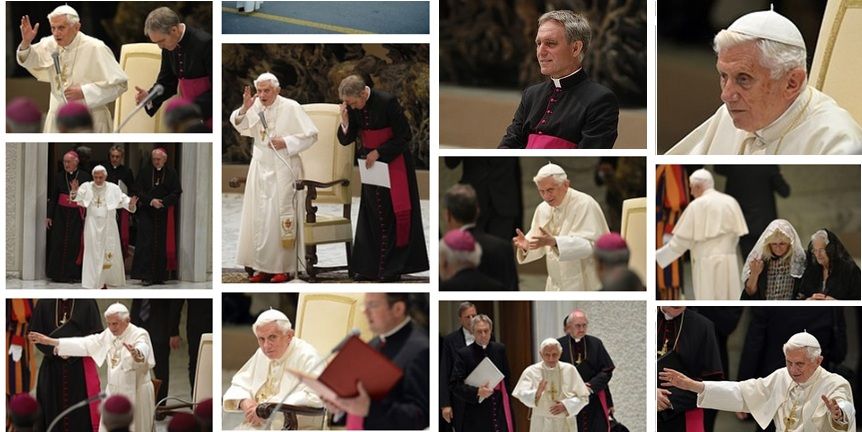
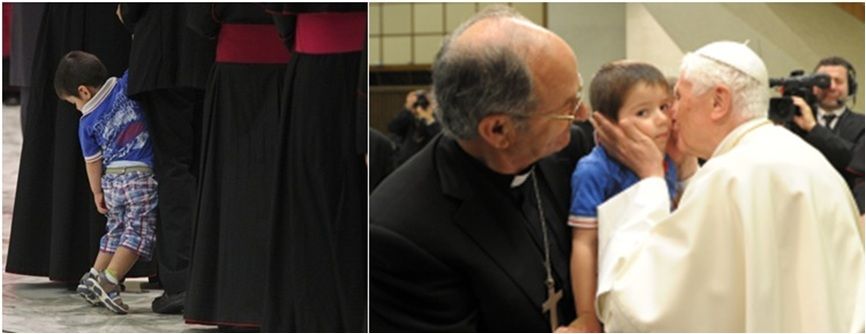
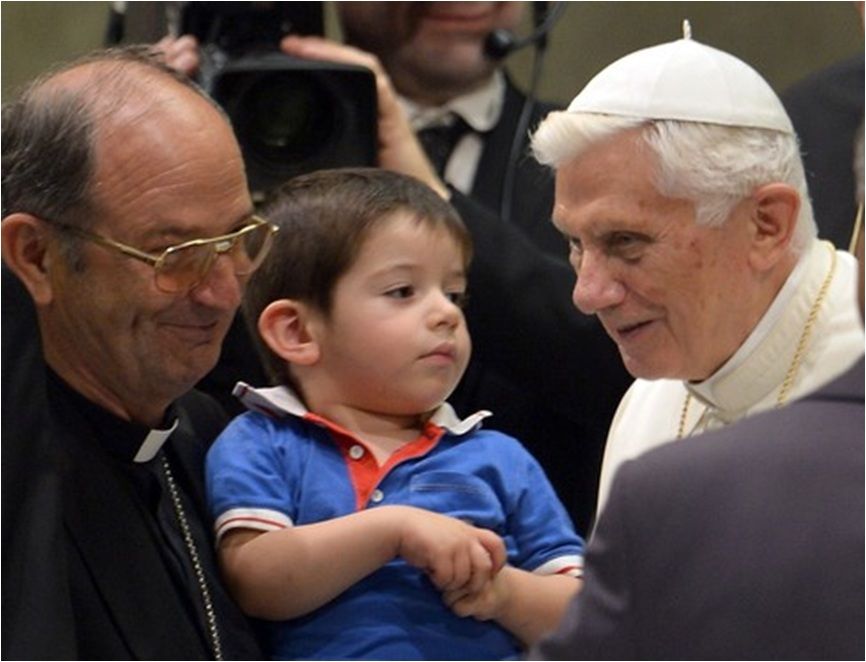
[Modificato da TERESA BENEDETTA 28/06/2012 06:05] |